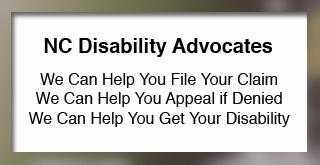
How do I win a disability case in North Carolina?
Home » How do I win a disability case in North Carolina?
by Tim Moore. Free Case Evaluation here.
To win disability benefits in North Carolina, a case must satisfy the Social Security Administration’s own unique definition of disability.
The definition essentially states that a person must have at least one severe condition, which may be mental or physical in nature, and that the condition must last for at least one full year, and may potentially result in death.

How do you prove that one, or more, of your conditions meet this definition?
After you apply for disability at a Social Security office in North Carolina, your case will be transferred to a disability examiner at North Carolina disability determination services, otherwise known as NC DDS.
Disability decisions at NC DDS usually take between 3 to 4 months (though they can take much longer, especially if the examiner has some difficulty obtaining your records from your treatment sources, or if you need to be scheduled for multiple consultative examinations) and typically have a fairly high rate of denial.
In some years, the approval rate may have gone as high as 35%, but in most years it tends to hover around 30%.
How does the disability examiner work on your case? The examiner is a claims specialist who will request medical records and review them, looking for signs of limitations in your ability to do basic, normal daily activities, which translates into your ability to perform a job.
The disability examiner uses a sequential evaluation process to see if your case meets the SSA definition of disability. Several questions are asked in this process.
The first question is whether or not you are currently working and earning what Social Security considers to be a substantial and gainful income. If you do happen to be working when you file for disability, most likely your claim will be denied that point. Your case will not even be sent to a disability examiner to have your medical records requested and evaluated.
If you are not working, the next question is whether or not your condition is considered severe versus nonsevere.
For example, if your only condition is an ankle sprain, most likely you will be considered to have a nonsecure condition and you will be turned down for disability benefits.
If your condition is considered to be severe, however, and this could be anything including even simple back pain, your case will move on to a real consideration of what your medical records have to say about your condition, or conditions.
At this point, the NC disability examiner will be going through the records they have obtained from your doctors, clinics, and hospitals.
What will the examiner be looking for specifically? Many people assume that the examiner is simply looking for a diagnosis of the condition. However, the process is more complex than that.
In the system used by the Social Security Administration, the condition you have is not nearly so important as the extent to which it limits your ability to engage in various areas of function.

Therefore, the examiner will be looking for evidence that you have trouble in any of the following areas: lifting more than a certain amount of weight, not being able to sit, stand, or walk for more than a certain amount of time, having trouble bending, stooping, reaching, grasping, seeing, hearing, remembering, concentrating etc, etc,etc.
Essentially, the examiner will be looking for signs of any reduced ability to do any basic physical or mental function. These are called “functional limitations”.
After your functional limitations have been noted, the examiner will assess, or rate, your limitations on something known as an RFC, or residual functional capacity form. The ratings that you receive will be compared to the types of work you’ve done in the past, and this will be used to make two critical determinations on your case.
First of all, can you go back to one of your past jobs? Secondly, can you perform some type of other work based on your skills, education, and age, and functional capabilities?
If the answer to both questions is no, you will most likely receive a Social Security Disability award, or an award for SSI if this is the program you applied
Seventy Percent of disability applications are denied in North Carolina. Complete the form below to get help with your disability claim. We are local, we understand how the system works in NC, and our consultation is FREE. After submitting, please scroll to the bottom for the confirmation that your form was sent, and to copy our phone number if you have further questions.

